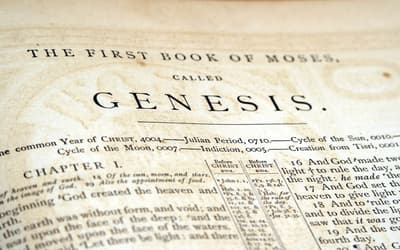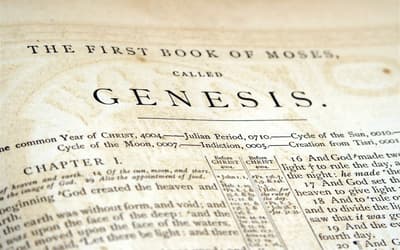The views expressed in this paper are those of the writer(s) and are not necessarily those of the ARJ Editor or Answers in Genesis.
Abstract
This paper offers a detailed rebuttal of Darek Isaacs’s criticisms of my recently published paper “Human Dominion and Reproduction” (Kulikovsky 2012). The paper demonstrates that Isaacs has confused concepts and mischaracterized my position to the point that his critique amounts to a straw man argument.
Keywords: human dominion, Fall, subdue the earth, Isaacs
Introduction
The January 2013 ARJ paper Is There a Dominion Mandate? generated some responses, published here with a reply by the author, linked below:
Is There a Dominion Mandate? Discussion papers:
- A Response to Darek Isaacs (Thomas D. Hennigan)
- In Defence of Human Dominion (Andrew S. Kulikovsky)
- The Dominion Mandate: Yesterday, Today, and Forever (Joel McDurmon)
Is There a Dominion Mandate? Response
Darek Isaacs’s recent paper “Is There a Dominion Mandate” (Isaacs 2013) offers a critique of my view of human dominion as published in the Journal of Creation (Kulikovsky 2012). Isaacs rejects my view as unbiblical, however, as this response will show, his patronizing critique contains a number of erroneous understandings and reveals a fundamental confusion of concepts. His arguments are deeply flawed and, in some cases, just plain silly. His misrepresentation and mischaracterization of some of my core points means that his critique is a straw man.1
The following sections offer detailed rebuttals to Isaacs’s main points and objections.
Did God Command Adam and Eve to Have Dominion Over Creation?
Isaacs claims that
a commanding position was being given to man, which is different from “commanding man to command,” which is how those championing a dominion mandate have rendered it in concept. (Isaacs 2013, pp. 2–3)
Moreover, he asserts that the burden of proof lies with those who claim that having dominion relates to a forceful demand from God to Adam which required obedience.
Isaacs appears to have little idea about how commands are expressed in the Hebrew language. According to him, the text must explicitly state that a command is being issued and there must be a consequence specified if the command is not obeyed. Isaacs cites Genesis 2:16–17 as an example. Thus, by Isaacs’s reasoning, God did not really command the Israelites to have no other gods (Exodus 20:3) nor did he command Abram to leave his country (Genesis 12:1) since neither of these texts (along with countless other clear commands) explicitly state that a command is being issued, nor do they specify a direct consequence if the command is disobeyed.
In Hebrew, commands are expressed in a number of ways, the most common of which are:
- Imperfect of instruction/prohibition: Imperfect verb (for example, Exodus 20:9; 20:3).
- Perfect of instruction: Waw-consecutive + perfect verb (for example, Genesis 45:10)
- Imperative: verb with imperative aspect (Genesis 12:1).
In Genesis 1:26, the imperfect of instruction is employed: “let them rule/have dominion over the fish of the sea …” This is confirmed by the use of the imperative mood for the corresponding verb αῤ χέτωσαν in the Septuagint. In Genesis 1:28, the imperative is explicitly used for פְּרוּ (perû, “be fruitful”), רְבוּ (rebû̲, “increase in number”), מִלְאוּּ (milʾû, “fill”), כִבְשֻהָ (kibšuhā, “subdue”) and רְדוּ (redû, “rule”). Therefore, for Isaacs to claim that Genesis 1:26, 28 was not a command is patently absurd and goes against what the Hebrew text and the Septuagint clearly indicate.
In addition, Isaacs argues that there could not have been any command to have dominion because prior to Genesis 3:6, Adam and Eve had no knowledge of sin since they had not yet eaten of the tree of the knowledge of good and evil. Thus, Isaacs (2013, p. 2) concludes that in the pre-Fall world there was only one law, and therefore one command, which was the prohibition against eating the fruit of the tree of the knowledge of good and evil. But Isaacs’s contention that knowledge of good and evil or knowledge of sin is a prerequisite for law does not follow. Their ignorance of good and evil and of sin did not prevent God commanding them not to eat from the forbidden tree. Moreover, Isaacs’s claim that there was only one law prior to the Fall is surely begging the question. If God commanded the human race to procreate and have dominion in Genesis 1:28, then does that not, by definition, make it law?
What Does it Mean to Have Dominion over Creation?
Isaacs (2013, p. 3) points out that in the present natural environment, “conditions are adverse” for human beings and they are “killed by acts of nature every year.” He argues that natural disasters and animals killing and maiming humans demonstrate that humans do not have dominion, and then cites many examples to “prove” his point. Furthermore, he adds that because thorns, thistles, and weeds choke farming crops, they “do not demonstrate an obedience to the will of the farmer, nor do all the insects which feed on the roots of the crops” (Isaacs 2013, p. 3). This situation stands in stark contrast to Jesus who had total control over nature (for example Luke 8:24–25). But this whole line of reasoning is a straw man. Isaacs appears to think having dominion equates to total control or absolute sovereignty, but this contention is false. According to the Concise Oxford English Dictionary (Soanes and Stevenson 2004), the word “dominion” refers to (1) sovereignty or control, and (2) the territory of a sovereign or government. There is no indication that total control or absolute sovereignty is implied. In fact, the second meaning indicates otherwise. A monarch or executive government may control and have sovereignty over a territory and its inhabitants, but that does not mean or imply that they control everything that occurs there; that there is no crime and the territory is immune from natural disasters. This misunderstanding of the meaning of dominion is a fatal flaw in Isaacs’s position.
Isaacs goes on to argue that dominion
is not the attempt or work to try to subdue. Nowhere is the struggle to overcome actually labeled the victory. Likewise, nor should the struggle against nature be labeled as the dominion. (Isaacs 2013, p. 3)
But again, his argument is based on a faulty understanding of what it means to have dominion. If we create vaccines that effectively eradicate certain diseases (for example, polio and smallpox) then we have not merely attempted or tried to subdue those diseases—we have succeeded.
According to Isaacs, the absence of total control and absolute sovereignty does not square with Adam being given dominion over nature in Genesis 1. Because the harmony that existed between man and beast in the beginning has been lost as a result of the Fall, Isaacs concludes that this implies a loss of dominion, and adds the haughty claim that to deny his argument “is to deny Scripture” (Isaacs 2013, p. 7). But, once again, Isaacs is guilty of a confusion of concepts. Dominion does not necessarily imply harmony. A tyrannical ruler has dominion over his subjects but there is no harmony in that kingdom! The Fall simply made dominion more difficult: multiplying and filling the earth now involved great pain; instead of eating from the trees in the garden, mankind now had to work the ground for his food and his labor would often only produce thorns and thistles.
The depictions of the behemoth and the leviathan in Job 40–41 are cited by Isaacs to demonstrate that mankind had no rule over these creatures, which, according to him, is what dominion would imply. However, he does not seem to understand that God’s interrogation of Job is directed at Job, not the entire human race. Job (or any other particular individual) may not personally be capable of capturing and taming these creatures but that does not mean mankind collectively could not capture and/or kill them. Indeed, when God blessed Noah and his sons, He stated the following:
Then God blessed Noah and his sons and said to them, “Be fruitful and multiply and fill the earth. Every living creature of the earth and every bird of the sky will be terrified of you. Everything that creeps on the ground and all the fish of the sea are under your authority. You may eat any moving thing that lives. As I gave you the green plants, I now give you everything. (Genesis 9:1–3, NET)
I am sure that Isaacs would agree that this would include both the behemoth and the leviathan.
Resisting the Fall
Isaacs also questions the notion that our stewardship role implies that we resist the Fall and reverse its effects. Although he acknowledges that כָּבַשׁ (kaḇaš, “subdue”) and רָדָה (rādâ, “rule”) “contain coercive, forceful elements” (Isaacs 2013, p. 11) he refuses to accept that this implies that Αdam was to tend the garden and work the ground. To Isaacs, this would mean the creation was initially hostile and that the original very good creation was actually in need of improvement:
Such a low view of God’s creation, and its ability to not completely provide for Adam’s needs is alarming. For it lessens the sin of eating from the tree of the knowledge of good and evil, because Adam may have argued he ate out of need, and not out of selfishness. This could place the fault at God’s hands for not providing a suitable environment for Adam that allowed for perfect obedience. (Isaacs 2013, p. 11)
He adds:
Kulikovsky’s conclusions … land him in a thorny theological place. For Kulikovsky’s outcomes are disastrous for the biblical model of a very good God, and very good creation. (Isaacs 2013, p. 11)
However, Isaacs mischaracterizes my point and thus
his conclusions do not follow. The garden and the land
outside the garden were perfectly capable of providing
all mankind’s needs, but that does not mean that no
work was required. Isaacs appears to think that the
need to work is purely a result of the Fall through
the sin of Adam and Eve, yet Genesis 2:15 makes it
clear that God instructed Adam to work and tend the
garden before the Fall: “The Lord God took the man
and placed him in the orchard in Eden to care for it
and to maintain it
” (New English Translation).
A distinction should also be made between the nature and amount of work that needed to be done after the Fall as compared to what needed to be done before the Fall. As I have stated, human dominion implies we actively resist the effects of the Fall, but there were obviously no effects to resist when the Fall had not yet occurred. Before the Fall, having dominion implied working the ground (Genesis 2:5), and working and tending the garden (Genesis 2:15). But after the Fall, the Curse meant that the amount of work increased and mankind needed to be more active: instead of just tilling and watering the ground, he now had to weed and fertilize it.2 Instead of being a fruitful and pleasurable experience, his work became difficult, painful, exhausting, and frustrating (Genesis 3:17–19).
Isaacs also criticizes the linguistic analysis of the Hebrew words kaḇaš and rādâ that I presented in my paper, and accuses me of proof-texting and selectively citing authorities. But Isaacs’s cavalier dismissal of the linguistic authorities is simply hubris. These linguistic resources were prepared by leading scholars3 based on extensive philological and etymological study of the extant texts and inscriptions. These scholars could be wrong, but the burden lies with Isaacs to demonstrate this rather than simply dismissing their work.
In addition, Isaacs suggests that I believe “the Creation was hardwired, from the beginning, to resist the dominion of Adam” and falsely states that I concluded that “the ‘very good’ creation must have been obstinate and uncooperative from the beginning” (Isaacs 2013, p. 11). This is not only false, it is another gross mischaracterization of my argument. Isaacs appears to be operating on the erroneous assumption that one can rightly impute personal and volitional characteristics to the impersonal creation. When discussing my viewpoint he speaks of creation being “hostile,” “obstinate and uncooperative,” “less than willing,” and having “a predisposition to be uncontrollable.” Neither I nor the linguistic authorities I cited described the creation in this way. The original “very good” creation operated according to the laws of nature that God had put in place at the beginning. The second law of thermodynamics meant that plants would die if they were not watered. Gravity meant that water flowed straight downhill, so it needed to be channeled or carried in vessels in order for it to be used for drinking. Again, these things would happen not because the creation was spoiled, evil, and willingly hostile and uncooperative, but because it operated in accordance with God’s laws.
Isaacs further asserts that the notion of man ruling over the creation “does not line up with the Bible” and claims I wrongly referred (as a “proof text”) to Psalm 8, because I misunderstood it. According to Isaacs, this Psalm “is not about mankind; it is referring to the coming Jewish Messiah” because Paul cited Psalm 8:6 in 1 Corinthians 15:27 (Isaacs 2013, p. 10).
With all due respect to Isaacs, it is he who has misunderstood the text and used a proof text (that is, Psalm 8:6). Psalm 8 is a hymn by David. In its original historical and literary context, it served as a song of praise to our Creator God. Anyone who reflects upon creation and comprehends the vastness of the universe and how small and insignificant human beings are in comparison, cannot help but acknowledge God’s majesty. Yet, despite our apparent insignificance, God cares for us and placed us in a position of glory and honor above the rest of His creation.
It should also be noted that the term “son of man” in Psalm 8:4 is not an allusion to the term “Son of Man” which Jesus used to describe Himself in the gospels. The term “son of man” is used extensively in Ezekiel and refers to the prophet himself (for example, Ezekiel 2:1). In Psalm 8, the term stands in a synonymous parallelism with “man” indicating that it is an alternative way of referring to a normal human being. Indeed, the exact same synonymous parallelism can be found in Psalm 144:3 which clearly refers to a normal human person.
What, then, do we make of the New Testament quotations of Psalm 8:6? This verse is cited three times in the New Testament and each instance applies it in a different way, although all have Christological significance. As Peter C. Craigie explains:
In the early church, the words of the psalm describing mankind’s role of dominion in the world (8:6–7) are given christological significance with respect to the dominion of Jesus Christ in his resurrection and exaltation. In one sense, this is quite a new meaning, not evidently implicit in the psalm in its original meaning and context. (Craigie 1983, p. 108)
In other words, the Apostle Paul has used a single verse from one of David’s songs of praise to illustrate Christ’s authority, power, and exalted position in God’s kingdom.
In 1 Corinthians 15:27, Paul uses Psalm 8:6 to illustrate that in the same way that God placed everything under the first Adam (Genesis 1:28; Psalm 8:6), He has now placed everything under the second Adam, Christ. The difference is that whereas Adam and his descendants are subject to death, Christ has now conquered it (cf. 1 Corinthians 15:24–26). This is an example of a Hebrew exegetical principle known as gezerah shavah (comparing similar expressions). “Paul interprets this Psalm as applying to the Messiah as the one who brings to fulfillment God’s intentions for humanity” (Beale and Carson 2007, p. 745).
The same quotation is used again in Ephesians 1:22 but for a very different purpose. Here the quotation refers to Christ’s position as head of the church. A different use again may be found in Hebrews 2:6–8. The writer notes that although the present reality may not indicate victory in salvation, their salvation would be made perfect through Christ’s humiliation, suffering, death, and ultimate resurrection and exaltation. Again, these quotations of Psalm 8:6 have been given new meaning and application in the light of the new covenant—a meaning and application quite different from its original. Note that only the New Testament quotations of Psalm 8:6 have been given a new meaning and application. These quotations do not change the meaning of Psalm 8:6 in its original historical and literary context as Isaacs seems to imply.4
In any case, it appears Isaacs has misunderstood what I mean by reversing the effects of the Fall. I have merely suggested that we have a responsibility and a mandate to resist evil and all its effects, including the physical effects in creation. Yes, human beings are fallen, but we are still image bearers of God, and there are also many instances where human ingenuity has led to great advances in agricultural production and marked improvements to human health and well-being. Furthermore, moral corruption has not completely impeded human innovation and ingenuity.5 It is surprising that Isaacs views the proposition of reversing the effects of the Fall as unbiblical when it is clearly implied right at the beginning just after the Fall occurred. God said to Adam:
[C]ursed is the ground thanks to you;
in painful toil you will eat of it all the days of your life.
It will produce thorns and thistles for you,
but you will eat the grain of the field.
By the sweat of your brow you will eat food
until you return to the ground,
for out of it you were taken;
for you are dust, and to dust you will return.
Genesis 3:17b–19 (New English Translation)
The cursed ground naturally produces thorns and thistles, yet Adam is to work the soil in order to produce the “plants of the field” that will be his food.
Finally, Isaacs also mischaracterizes my argument regarding mankind having control over the creation. He claims that I argue that “ownership over something must mean control over something” (Isaacs 2013, p. 12) even though I explicitly stated that possession, rather than ownership, implies control. Psalm 115:16 states that the earth has been given to mankind and therefore mankind has ultimate control (though not absolute control). Isaacs asserts that mankind’s possession of the earth was negated by the Fall, but he offers no biblical evidence to support his assertion. Instead, he resorts to citing scenarios that are not at all analogous:
If a donkey is given to a man it does not mean the donkey is going to walk whenever the man tugs the bridle … Just because this creation is the mortal home of man it does not mean that the home obeys man or that we can subdue it into not having tornadoes, hurricanes, floods, earthquakes, lightning strikes, and the like. It is obvious that the original sin of Adam changed man’s control and dominion was forfeited. (Isaacs 2013, p. 12)
But that is not what having dominion and control means or implies. A man may not be able to make the donkey walk, but he can train it to do so, and if it will not be trained he can destroy it and find a donkey that can be trained. Mankind cannot prevent tornadoes, hurricanes, floods, earthquakes, and lightning strikes, but we can build stronger buildings to withstand strong winds and earth movements. We can build dams, dikes, levies, and spillways to prevent or minimize flooding, and erect lightning rods to neutralize lightning strikes.
Conclusion
It should be clear from the above that Isaacs’s criticisms of my view of human dominion are unwarranted and do not stand up to logical or exegetical scrutiny. He has made a number of fundamental exegetical and conceptual errors, and grossly misrepresented and/or mischaracterized my views and arguments. Therefore, I continue to stand by all the propositions and arguments I have put forward in my original paper.
I will conclude my response by quoting Isaacs himself and suggest that he take his own good advice:
Making things up is never the answer to solving biblical questions. Sticking to the simple language in the divinely inspired text is where the answers reside. (Isaacs 2013, p. 8)
References
Beale, G. K. and D. A. Carson. eds. 2007. Commentary on the New Testament use of the Old Testament. Grand Rapids, Michigan: Baker.
Craigie, P. C. 1983. Psalms 1–50: Word biblical commentary. Dallas, Texas: Word.
Isaacs, D. 2013. Is there a dominion mandate? Answers Research Journal 6:1–16. Retrieved from http://www.answersingenesis.org/articles/arj/v6/n1/dominion-mandate.
Koehler, L. and W. Baumgartner. 2000. Hebrew and Aramaic lexicon of the Old Testament. Leiden, Netherlands: Brill.
Kulikovsky. A. S. 2012. Human dominion and reproduction. Journal of Creation 26, no. 1:43–47.
Oswalt, J. and W. White. 1980. Theological wordbook of the Old Testament, ed. R. L. Harris, G. L. Archer Jr., and B. K. Waltke. Chicago, Illlinois: Moody Press.
Soanes, C. and A. Stevenson. eds. 2004. Concise Oxford English dictionary, 11th ed. New York, New York: Oxford University Press.
Swanson, J. 1997. Dictionary of biblical languages with semantic domains: Hebrew Old Testament. Oak Harbor, Washington: Logos Research Systems.
Winkler, S. 2012. Taiwan’s UN Dilemma: To Be or Not To Be. Taiwan-US Quarterly Analysis 9. Washington D.C., United States: Brookings Institute. Retrieved from http://www.brookings.edu/research/opinions/2012/06/20-taiwan-un-winkler.










